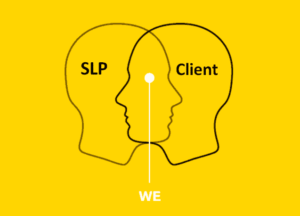My First Speech Therapy Session
 While in graduate school, I learned about the Neural Mechanisms of Speech, Language and Hearing. I don’t want to brag, but I also studied Acquired Language & Cognitive-Communication in Adults. I would soon find out that this didn’t guarantee that I would provide better speech-language therapy. When I started my practicum at an inpatient facility in Madison, I was totally ready. I had a sheet of paper with my client’s language goals, and I spent the evening prior planning out my session. Then, I met my first patient. With each (brilliantly planned speech) question, she would respond with a story about her son. With every initiation of my planned activity, she would cry and tell me about her lovely garden at home and its beautiful yard ornaments. I was confused, stumped and, essentially, a futile SLP-to-be. My brain knew what to do with her language disorder, but this knowledge got me nowhere.
While in graduate school, I learned about the Neural Mechanisms of Speech, Language and Hearing. I don’t want to brag, but I also studied Acquired Language & Cognitive-Communication in Adults. I would soon find out that this didn’t guarantee that I would provide better speech-language therapy. When I started my practicum at an inpatient facility in Madison, I was totally ready. I had a sheet of paper with my client’s language goals, and I spent the evening prior planning out my session. Then, I met my first patient. With each (brilliantly planned speech) question, she would respond with a story about her son. With every initiation of my planned activity, she would cry and tell me about her lovely garden at home and its beautiful yard ornaments. I was confused, stumped and, essentially, a futile SLP-to-be. My brain knew what to do with her language disorder, but this knowledge got me nowhere.
To have better speech-language therapy we must include empathy

Empathy Results in more Meaningful & Better Speech-Language Therapy
In my case, I learned that my patient missed home. She took great pride in the time and heart-energy she gave to her floral backyard sanctuary and felt immense sadness to be away from her safe place. When I finally broke down my SLP-brain-wall, I began to observe and attend to the details of her words to get a better understanding of her needs. Here’s the other thing. If someone feels they are understood, they are more apt to give their all, try their hardest, and collaborate. So, dear SLPs, empathy results in more meaningful and better speech-language therapy.
Here’s to slowing down, empathizing and leading with the heart. The outcomes will surely be grand.
Here are a few more resources for you:
Becca Eisenberg’s 10 Qualities Every SLP Should Have
Counseling Skills for Speech-Language Pathologists and Audiologists



